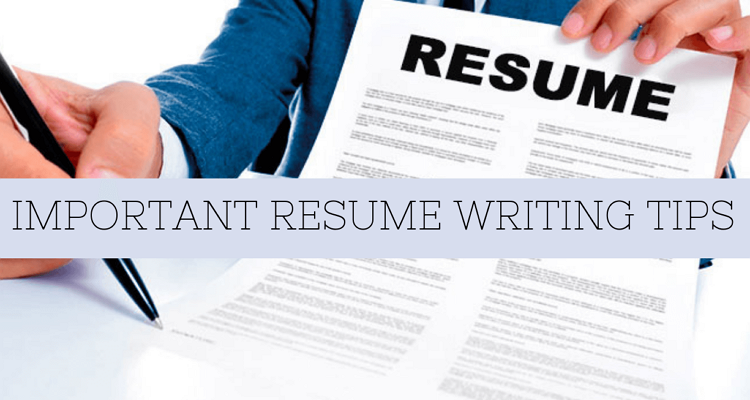Resume writing tips and the Art of Selling Yourself
Resume writing tips to make a winning CV is critical for success. Most Resumes end up in the waste paper basket within 1 minute and nothing more than a glance from the recruiter. The goal of resume writing is to make the most of that window of opportunity to sell yourself to the recruitment manager. Your CV must sell you.
Top Reasons why people write a CV
- A job advertisement that appeals to you
- You want to market yourself by creating a linkedin profile and writing a CV to win some business or be elected to some post
- You want to work for some particular organization and thought that sending your CV might be the best way to gain their attention
- There is a chance of an internal job role that you are interested in, within your organization
- You are going to get a promotion soon and a CV might be required
- Want to start working on your CV to find other job opportunities with a fear that you might lose your job.
- Writing a CV might be a good idea to remember and streamline your achievements when you are trying to organize your life.
Selling yourself
A lot of students and professionals are why shy about presenting their best. It is not normal for people to be confident and assertive. If you don’t tell the recruiter, the recruiter has no way to know what kind of individual you are and the strengths you possess. You HAVE to sell yourself. Consider your competition. No one is going to be as reserved as you are, and people are going to blow their trumpet loud and clear.
So while selling yourself is critical, there is a fine line between selling yourself and bad selling.
Imagine these 3 cases
Negative Selling
I did not enjoy my job, so I took a sabbatical and tried setting up my own business. I tried different things , but failed. So I am now looking for a job again.
Good Selling
After working in my job for a few years, I had an opportunity to run my own start up. I took up this challenge and it offered me great lessons in the importance of teamwork, management and leadership skills. I now seek to utilize these skills in my next job.
Bad Selling
My job was not challenging enough and I think i am intellectually very smart . I left my job to pursue more challenging opportunities worth my time. Then I set up a great business, where everyone agreed i was the best guy and a great leader. Subsequent to that I am now ready to turnaround your business and looking for a job that best suits my skills.
The purpose of this example is to understand that while selling yourself is critical and important, it should not be wild and blatant lies.
Font and Formats
Using a coloured paper or unusual formats are generally not appreciated by recruiters. Any coloured papers used and printed with strange fonts are considered too out of the ordinary and studies have shown , dont lead to shortlisting.
The chances of shortlists are highest when a CV is printed on a white paper with a standard font.
Details
Dont lay out your entire life in its entirety with every detail and expecting the recruiter to pick up the
skills most required for the job and marvel at your honesty at the same time.
Be Positive
If you cannot say something in a postive way, dont say it at all.
Job Fit
Tailoring your CV to the Right Job “Fit”
Recruiters, headhunters talk in terms of Job Fit. You may be highly qualified but if your CV is not matching the job requirements in the mind of the Recruiter, your dont stand a chance.
So how do we know what is a job Fit ?
Recruiters typically scan a CV on 4 main parameters
- Knowledge
- Skills
- Abilities
- Attitude
Consider a situation that there are 3 candidates Nancy, Rachel and Charlotte applying for a job in retail store managing the point of sale software and the cash till , where the job requirement is to run the accounting software. Let us look at the their CVs that they have submitted for this job role, and see the decision making process from the eyes of the recruiter based on the 4 main parameters of Job Fit.
1. Knowledge
Job requirement – Knows how a point of sale software works and knows how to deal with retail customers
Lets look at the responses
Nancy – Degree in information technology with internship at McDonalds for 6 months.
Rachel – worked in my uncle’s fast food joint for 2 years
Jane – Worked at Mark and Spencers for 3 years
2. Skills
Job requirement – Good Communication skills and numeracy levels
Lets look at the responses
Nancy – Easily able to handle point of sale transactions including cash and card
Rachel -Easily able to handle cash and card transactions.
Jane – Easily able to handle cash and card transactions.
3. Abilities.
Job requirement – To learn how to use point of sale software, process card transactions and refunds.
Lets look at the responses
Nancy – Can easily learn new skills
Rachel -No difficulty in learning new skills though never have done this.
Jane – Can deal with the new software with some training.
4. Attitude
Job requirement – Punctual, Polite and able to deal with a lot of people calmly.
Lets look at the responses
Nancy – Strong willed and self confident and very assertive.
Rachel -Honest and straight forward.
Jane – Punctual, calm and honest.
Based on these responses, while Nancy does come out as the most educated candidate, she wont get the job, because she fails miserably on the attitude fit. She is seen as a strong headed person by the recruiter, who might get into arguments with customers, something that the job can ill afford.
While different people might look at this situation differently, the point we are trying to make here is that it is important to perceive the job opening from the point of view of the recruiter and then tailor make your responses accordingly as the chances of presenting yourself are slim, and you have 30 seconds only.
Improving the Job – CV Fit
You can make yourself look like the best candidate for the Job , if only you detail the job requirement properly and then tailormake your CV in response to that Job.
Nancy in the above example, might not be a strong headed person. If only she would have said the same thing differently and come out as more customer friendly person, and assertive in a positive way, where she not only helps on the cash counter, but helps customers make the right decisions in their purchase, she would definitely have been hired, given her strong educational background too.
Bottomline is that the CV should always be written with the job in mind. Think about what an employer is looking for before you write your CV. Do your homework before applying for a job. Find about the company through the internet, industry journals and through friends and relatives working in the company or similar businesses.
Reading through the Job advertisement
Even before you start writing your resume, you need to go through the job advertisement with the following questions in your mind
What dont you understand about the job advertisement ?
What is the industry type of the company and whats happening in that industry ? is it an expanding business opportunity ?
What is the main purpose of the role on offer ?
Why is this role important to the company and more specifically how does it contribute to the profits of the business ?
What type of skills is the company looking for , in this role ?
What kind of personal qualities is the company looking for, in this role ?
Am I qualified enough through my educational qualifications and experience to apply for this role ? If not, what can I do or write to make up for it ?
Once you have thoroughly investigated and figured out an answer to the above questions, now is the time to sit down and make a CV in a way that answers all these questions and is a great fit for the job.
Finally avoid some of the most common faults in a CV ,i.e.
- Forgetting some potentially impressive achievement.
- Thinking some of your achievements might not be relevant
- Underselling yourself by not talking properly about your achievements
- Including every boring detail in your CV, which is not even relevant.
Building a personal history is important in the CV as all the recruiters are very keen to know your background.
- Stages of Life that recruiters are keen for you to talk about
- Secondary School (typically upto 18 years)
- Vocational Training (16-21 years)
- Graduation / University (upto 22 years)
- Postgraduation (typically early 20s)
- Jobs held in the first 5 years after completing your education
- Jobs held in your 30s
- Job held in your 40s
- Job held in your 50s and so on
- Any life achievements at any stage
- Awards/ sports / hobbies are important to be mentioned to decide the fit.
Now, get ready to create your professional resume with Vskills in just 5 minutes !!




3 Comments. Leave new
Nice article. Thanks for your opinion.
However there should a notice that even though you got a call and invitation for an interview, the task is just begun. The second and the most challenging part is to sell yourself on an interview
Nice article, but also we shouldn`t forget that there is another challenge once you`ve got a call with invitation to the interview. Lots of candidates fail on face to face interview, and most of the times just because of lack of confidence
very interesting article! thanks for sharing!